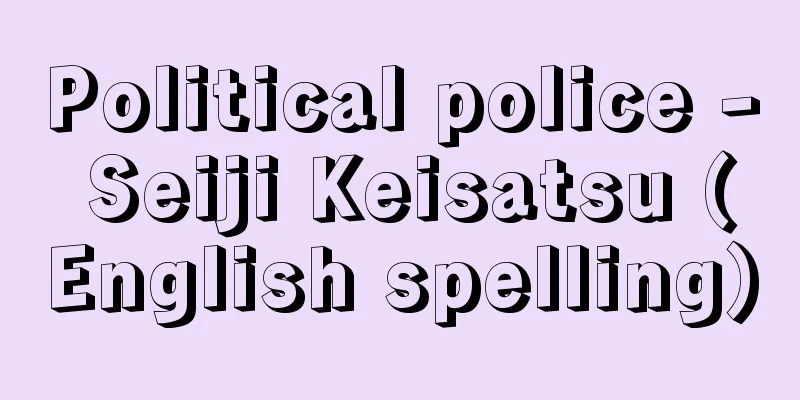Political police - Seiji Keisatsu (English spelling)

|
A division of the administrative police, also known as the higher police, whose purpose is to prevent and investigate political crimes and ensure the security and stability of a particular political system and administration. [Nukazuka Yasue] historyThe origin of the political police is said to be the so-called "Black Secret Offices" of the 17th and 18th century European absolute monarchies, which gave birth to the idea of a police state. They had broad authority and suppressed anti-establishment movements in arbitrary ways, such as arresting and detaining without a warrant, torturing, and taking people to concentration camps. Although they claimed to be serving the "public welfare," the political police's mission was to eliminate and thwart any criticism or resistance against the absolute monarch, and they merely served the selfish purposes of the monarch or powerful ministers. Therefore, the political police, along with the military, became a powerful weapon to protect a specific political ruling class, and was the key to the ruling mechanism of an absolutist state. In the 19th century, Tsarist Russia established a political police force called the Okhrana (Okhranka) to counter terrorism by the Narodniks and the SRs. The modern political police originated from the secret police network established by J. Fouché to suppress both the royalists and the Jacobins immediately after the French Revolution. It is said that the Prussian political police was modeled after the French political police, and was essentially inherited by the Gestapo (secret state police) of Nazi Germany. [Nukazuka Yasue] Japan before World War IIThe Japanese police system has placed emphasis on political police since early times, and an organization for this purpose has been established. In 1881 (Meiji 14), matters related to "political police," "publications," and "foreigners" were listed as important parts of the Metropolitan Police Department's responsibilities and placed under the jurisdiction of the Internal Bureau. The Political Police Section continued to be in charge of the department even after the transition of the supervising bureau, and in 1906 (Meiji 39), it was renamed the High Police Section. In response to the spread of democratic ideas from the 1890s onwards, the accompanying rise in political consciousness among the local people, and the development of party politics, High Police Sections were established in all prefectures in 1911 and 1912, and an organizational structure for political police was established nationwide. The High Treason Incident made the government's vigilance against socialist movements decisive, and in addition to the High Police Section, the Special High Police Section (Tokko) was established in the Metropolitan Police Department Secretariat in 1911. In 1925 (Taisho 14), Tokko Police Sections were established in all prefectures, completing a nationwide organizational network, and in order to protect the "national polity," they encroached on the jurisdiction of the Higher Sections and severely cracked down on anti-establishment movements, and even on ideas that were considered to be anti-establishment. Taking advantage of the election purges in 1936 (Showa 11), the Tokko Police forced the Higher Sections to be abolished and monopolized the position of political police, but after World War II, the organization was abolished along with related laws and regulations by order of GHQ. For the above reasons, political police tend to be considered characteristic of absolutist or dictatorial states. This gives rise to the idea that "democracies do not have political police." However, even in democracies, political police have always existed as the foundation of the state's existence. Their mission is to protect the state or its organs, the constitutional order, and its citizens from anti-constitutional or anti-national plots, to detect and prevent plots to disrupt or destroy the constitutional state order, and to monitor and, if necessary, investigate individuals, groups, and organizations suspected of such activities. Political police are often combined with secret intelligence agencies that obtain and collect the information required for their mission. It is well known that political police are active in the FBI and CIA in the United States, as well as in the United Kingdom, France, and Germany. [Nukazuka Yasue] Japan after World War IIIn addition to the so-called citizen police activities, Japan's current Police Law states that the police are responsible for political police, stating that "maintenance of public safety and order." The role of political police is played by the Public Security Intelligence Agency, the Security Division and Public Safety Division of the Metropolitan Police Department, and the Security Bureau of the National Police Agency. Even under the old Police Law, as the transition from the occupation system to the security system was underway, there were a series of clashes between students and police officers who entered the campuses of universities around the country to gather security information, such as the Popolo Incident at the University of Tokyo in 1952 and the Aichi University Incident, which tested the autonomy of universities, and the existence of political police under a modern constitution that aims to protect human rights cannot help but raise serious questions. This is because political police activities (1) are conducted in relation to the risk of vague crimes that may occur in the future and therefore cannot be specified, (2) are targeted solely at those that the authorities judge to be disruptive and violent by the masses, despite the fact that political associations and group activities are guaranteed by the Constitution, which is the foundation of democratic politics, and therefore the scope of the investigative activities expands indefinitely and there is a risk that they will affect the people's freedom of thought, academic freedom, speech, and political freedom, and (3) are conducted by means of espionage such as stakeouts, tailing, secret travel, and wiretapping. It has been pointed out that behind political police activities is the idea that the police are "guardians," that they protect the existence of the state, despite the democratic purpose that they claim to have. In a democratic state, it is supposed to be the people who should decide on important issues such as what endangers the existence of the state and what is essential to the state. [Nukazuka Yasue] "Japan's Political Police" by Tatsuzo Ohno (Shin Nihon Shinsho, Shin Nihon Shuppansha) [References] | | | | | | | | |Source: Shogakukan Encyclopedia Nipponica About Encyclopedia Nipponica Information | Legend |
|
政治犯罪の阻止・捜査に携わり、特定の政治体制と政権の安全および安定を図ることを目的とする行政警察の一部門。高等警察ともいう。 [糠塚康江] 歴史警察国家観念を生み出した17、18世紀のヨーロッパ絶対君主制国家のいわゆる「黒い機密官房」が、政治警察の始まりとされる。それは広範な権限をもち、令状のない逮捕・拘留、拷問、強制収容所への連行など、恣意(しい)的なやり方で反体制運動を弾圧した。口では「公共の福祉」を唱えていたが、政治警察は絶対君主に対するいっさいの批判・抵抗を排除・挫折(ざせつ)させることを使命とし、君主なり権勢のある大臣なりの利己目的に仕えたにすぎない。それゆえ政治警察は、軍隊と並んで、特定の政治支配層を守る強力な武器となり、絶対主義国家の支配機構のかなめであった。19世紀に入り、ツァーリズムのロシアは、ナロードニキ、SR(エスエル)などのテロリズムに対抗して、オフラナ(オフランカ)とよばれる政治警察を設けている。近代政治警察は、フランス革命直後、王党派・ジャコバン派の左右両派抑圧のため、J・フーシェが創設した秘密警察網に端を発する。プロイセンの政治警察はこのフランスの政治警察に範をとり、ナチス・ドイツのゲシュタポ(秘密国家警察)によって基本的に継承されたといわれている。 [糠塚康江] 第二次世界大戦前の日本日本の警察制度は早くから政治警察に比重を置き、そのための機構が整備されてきた。1881年(明治14)には、警視庁の職責の重要な部分として「政治警察」「出版物」「外国人」に関する事項があげられて内局の所掌事項とされ、その後も政治警察課は、主管部局の変遷にもかかわらず継続して、1906年(明治39)高等課に名称を改めている。明治30年代以降のデモクラシー思想の普及とそれに伴う地方民衆の政治意識の向上、さらには政党政治の発達に対応して、1911、1912年には全府県に高等警察課が新設され、政治警察をつかさどる組織機構が全国的に整備された。大逆事件は社会主義運動に対する政府の警戒を決定的にし、高等課のほかに1911年警視庁官房に特別高等課(特高)が設けられた。1925年(大正14)全府県に特高警察課が設置されて全国的組織網が完成され、「国体」護持のため、高等課の所管事項を侵食して反体制運動、ひいては反体制運動とみなされる思想をも厳しく取り締まり、弾圧した。1936年(昭和11)の選挙粛正を機会に、特高警察は高等課を廃止に追い込み政治警察の地位を独占したが、第二次世界大戦後、GHQの指令により、関連法規とともにその組織は廃止された。 前記のことから、政治警察は絶対主義国家ないし独裁制に特徴的なものとされがちである。そこから「民主主義国家に政治警察なし」という系も生じてくる。しかし民主主義国家にも政治警察は国家存立の根幹として絶えず存在してきた。その任務は、国家もしくはその機関または憲法秩序および市民を反憲法的ないし反国家的企てから保護すること、立憲的国家秩序の攪乱(かくらん)および破壊の企図を摘発し阻止すること、それに関し容疑のある個人・集団・組織を監視し、必要とあれば捜査することである。政治警察は、その任務に要する情報を入手・収集する秘密情報機関と結合されていることが多い。アメリカのFBI、CIAをはじめ、イギリス、フランス、ドイツなどに政治警察が活動していることは、周知である。 [糠塚康江] 第二次世界大戦後の日本日本の現行警察法は、いわゆる市民警察活動に加え、「公共の安全と秩序の維持」という表現で政治警察を警察の責務としている。政治警察の役割を担っているのが、公安調査庁、警視庁の警備課・公安課、警察庁の警備局である。旧警察法下ではあるが、占領体制から安保体制への転換が図られていたなかで、1952年(昭和27)東大ポポロ事件、愛知大学事件をはじめ、各地の大学で学生と警備情報収集活動のため構内に立ち入った警察官との衝突事件が続発し、大学の自治が試されたように、人権保障を目的とする近代憲法の下での政治警察の存在は、深刻な疑問を提起せざるをえない。なぜなら、政治警察活動は、(1)将来起こるかもしれない、したがって特定されえない漠然たる犯罪の危険との関連において行われ、(2)民主政治の基礎をなす憲法で政治的結社活動・団体活動が保障されているにもかかわらず、もっぱら当局の判断において秩序破壊的であり、多衆の暴力だとされるものを対象とするため、捜査活動の範囲は無限に拡大して、国民の思想・学問・言論の自由、政治的自由に及ぶおそれがあり、(3)張込み・尾行・密行・盗聴などのスパイ行為を手段とするものだからである。そもそも政治警察の背後には、掲げる目的の民主性にもかかわらず、国家の存立は警察が守るという、警察を「後見人」ととらえる発想があると指摘されている。民主主義国家にあっては、何が国家の存立を危うくし、何が国家にとって不可欠かという重大な問題を判断するのは、本来、国民のはずだと思われる。 [糠塚康江] 『大野達三著『日本の政治警察』(新日本新書・新日本出版社)』 [参照項目] | | | | | | | | |出典 小学館 日本大百科全書(ニッポニカ)日本大百科全書(ニッポニカ)について 情報 | 凡例 |
<<: Political talk - Seijikodan
Recommend
Cardiac catheterization - Shinzou Catheterho (English spelling)
Cardiac catheterization is also called cardiac cat...
Primary independence - Ichijidokuritsu
A mathematical term used to describe the interrel...
Kaward [I] - Kaward
…In the middle of the 5th century, the Hephthalit...
Hadrianopolis
… He loved Greek culture, especially the city of ...
Palmchats (palm birds) - palmchats (English spelling)
A passerine bird of the family Pelopidae. This fam...
Noin Ula (English spelling)
A Xiongnu tomb in the Noin-Ula Mountains, about 10...
Edo Haruma
…His given name was Ya, his pen name was Shiraha,...
Gun Club Check
…(4) Coigach: Based on shepherd check, with alter...
Nördlingen - Nerutoringen (English spelling) Nördlingen
A town in Bavaria in southern Germany. Population...
Criticism of the Intermediate Person Theory
In August 1962, the China Writers Association held...
force
...But strictly speaking, gravity has different m...
Wang Mang - Wang Mang
Founder of the Xin Dynasty in China (reigned 9-23...
ECD (Display)
...Various operating modes are known, but general...
Noto Province
The old name of the province that occupies most o...
thick-billed shrike
...Distributed in East Asia, in Japan it migrates...









